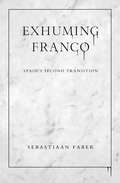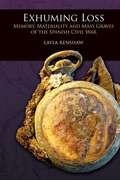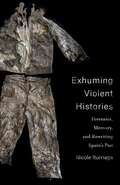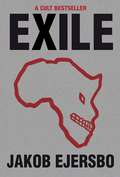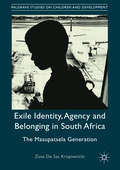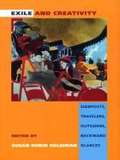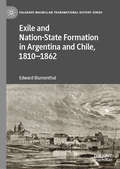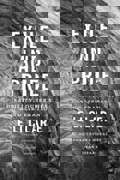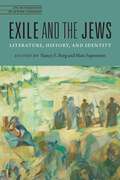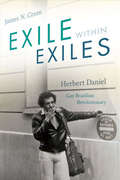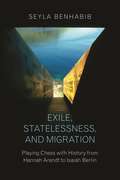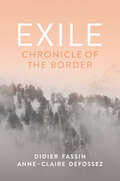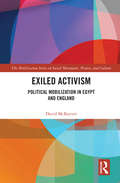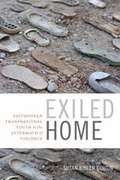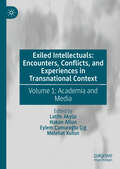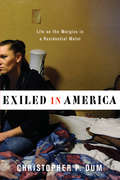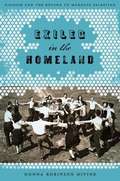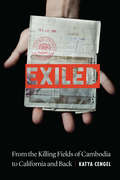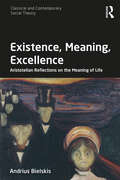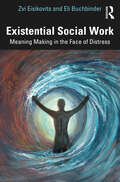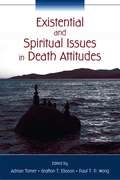- Table View
- List View
Exhuming Franco: Spain's Second Transition, Second Edition
by Sebastiaan FaberThrough dozens of interviews, intensive reporting, and deep research and analysis, Sebastiaan Faber sets out to understand what remains of Francisco Franco's legacy in Spain today. Faber's work is grounded in heavy scholarship, but the book is an engaging, accessible introduction to a national conversation about fascism. Spurred by the disinterment of the dictator in 2019, Faber finds that Spain is still deeply affected—and divided—by the dictatorial legacies of Francoism. This new edition, with additional interviews and a new introduction, illuminates the dangers of the rise of right-wing nationalist revisionism by using Spain as a case study for how nations face, or don't face, difficult questions about their past.
Exhuming Loss: Memory, Materiality and Mass Graves of the Spanish Civil War (UCL Institute of Archaeology Critical Cultural Heritage Series)
by Layla RenshawThis book examines the contested representations of those murdered during the Spanish Civil War of the 1930s in two small rural communities as they undergo the experience of exhumation, identification, and reburial from nearby mass graves. Based on interviews with relatives of the dead, community members and forensic archaeologists, it pays close attention to the role of excavated objects and images in breaking the pact of silence that surrounded the memory of these painful events for decades afterward. It also assesses the significance of archaeological and forensic practices in changing relationships between the living and dead. The exposure of graves has opened up a discursive space in Spanish society for multiple representations to be made of the war dead and of Spain’s traumatic past.
Exhuming Violent Histories: Forensics, Memory, and Rewriting Spain’s Past
by Nicole IturriagaMany years after the fall of Franco’s regime, Spanish human rights activists have turned to new methods to keep the memory of state terror alive. By excavating mass graves, exhuming remains, and employing forensic analysis and DNA testing, they seek to provide direct evidence of repression and break through the silence about the dictatorship’s atrocities that persisted well into Spain’s transition to democracy.Nicole Iturriaga offers an ethnographic examination of how Spanish human rights activists use forensic methods to challenge dominant histories, reshape collective memory, and create new forms of transitional justice. She argues that by grounding their claims in science, activists can present themselves as credible and impartial, helping them intervene in fraught public disputes about the remembrance of the past. The perceived legitimacy and authenticity of scientific techniques allows their users to contest the state’s historical claims and offer new narratives of violence in pursuit of long-delayed justice.Iturriaga draws on interviews with technicians and forensics experts and provides a detailed case study of Spain’s best-known forensic human rights organization, the Association for the Recovery of Historical Memory. She also considers how the tools and tactics used in Spain can be adopted by human rights and civil society groups pursuing transitional justice in other parts of the world. An ethnographically rich account, Exhuming Violent Histories sheds new light on how science and technology intersect with human rights and collective memory.
Exile
by Jakob EjersboFor the vagabond pack of ex-pat Europeans, Indian Tanzanians and wealthy Africans at Moshi's International School, it's all about getting high, getting drunk and getting laid. Their parents - drug dealers, mercenaries and farmers gone to seed - are too dead inside to give a damn. Outwardly free but empty at heart, privileged but out of place, these kids are lost, trapped in a land without hope. They can try to get out, but something will always drag them back - where can you go when you believe in nothing and belong to nowhere? Exile is the first of three powerful novels about growing up as an ex-pat in Tanzania. Ejersbo's first novel, Nordkraft, the Danish Trainspotting, was a phenomenal bestseller. Ejersbo's trilogy, only published after his death in 2008, has proved to be another cult and critical sensation.
Exile (The Africa Trilogy)
by Jakob EjersboFor the vagabond pack of ex-pat Europeans, Indian Tanzanians and wealthy Africans at Moshi's International School, it's all about getting high, getting drunk and getting laid. Their parents - drug dealers, mercenaries and farmers gone to seed - are too dead inside to give a damn. Outwardly free but empty at heart, privileged but out of place, these kids are lost, trapped in a land without hope. They can try to get out, but something will always drag them back - where can you go when you believe in nothing and belong to nowhere? Exile is the first of three powerful novels about growing up as an ex-pat in Tanzania. Ejersbo's first novel, Nordkraft, the Danish Trainspotting, was a phenomenal bestseller. Ejersbo's trilogy, only published after his death in 2008, has proved to be another cult and critical sensation.
Exile And Pride: Disability, Queerness and Liberation
by Eli ClareExile and Pride is a call to awareness, an exhortation for each of us to examine our connection to and alienation from our environment, our sexuality, and each other.
Exile Identity, Agency and Belonging in South Africa
by Zosa De Sas KropiwnickiThis book examines the experiences of 49 second-generation exiles from South Africa. Using “generation” as an analytical concept, it investigates the relational, temporal and embodied nature of their childhoods in terms of kinship relations, life cycle, cohort development and memory-making. It reveals how child agents exploited the liminal nature of exile to negotiate their sense of identity, home and belonging, while also struggling over their position and power in formal Politics and informal politics of the everyday. It also reflects upon their political consciousness, identity and sense of civic duty on return to post-apartheid South Africa, and how this has led to the emergence of the Masupatsela generational cohort concerned with driving social and political change in South Africa.
Exile and Creativity: Signposts, Travelers, Outsiders, Backward Glances
by Susan Rubin SuleimanA major historical phenomenon of our century, exile has been a focal point for reflections about individual and cultural identity and problems of nationalism, racism, and war. Whether emigrés, exiles, expatriates, refugees, or nomads, these people all experience a distance from their homes and often their native languages. Exile and Creativity brings together the widely varied perspectives of nineteen distinguished European and American scholars and cultural critics to ask: Is exile a falling away from a source of creativity associated with the wholeness of home and one's own language, or is it a spur to creativity?In essays that range chronologically from the Renaissance to the 1990s, geographically from the Danube to the Andes, and historically from the Inquisition to the Holocaust, the complexities and tensions of exile and the diversity of its experiences are examined. Recognizing exile as an interior experience as much as a physical displacement, this collection discusses such varied topics as intellectual exile and seventeenth-century French literature; different versions of home and of the novel in the writings of Bakhtin and Lukács; the displacement of James Joyce and Clarice Lispector; a young journalist's meeting with James Baldwin in the south of France; Jean Renoir's Hollywood years; and reflections by the descendents of European emigrés. Strikingly, many of the essays are themselves the work of exiles, bearing out once more the power of the personal voice in scholarship.With the exception of the contribution by Henry Louis Gates Jr., these essays were originally published in a special double issue of Poetics Today in 1996. Exile and Creativity will engage a range of readers from those whose specific interests include the problems of displacement and diaspora and the European Holocaust to those whose broad interests include art, literary and cultural studies, history, film, and the nature of human creativity.Contributors. Zygmunt Bauman, Janet Bergstrom, Christine Brooke-Rose, Hélène Cixous, Tibor Dessewffy, Marianne Hirsch, Denis Hollier, Henry Louis Gates Jr., Linda Nochlin, Leo Spitzer, Susan Rubin Suleiman, Thomas Pavel, Doris Sommer, Nancy Huston, John Neubauer, Ernst van Alphen, Alicia Borinsky, Svetlana Boym, Jacqueline Chénieux-Gendron
Exile and Nation-State Formation in Argentina and Chile, 1810–1862 (Palgrave Macmillan Transnational History Series)
by Edward BlumenthalThis book traces the impact of exile in the formation of independent republics in Chile and the Río de la Plata in the decades after independence. Exile was central to state and nation formation, playing a role in the emergence of territorial borders and Romantic notions of national difference, while creating a transnational political culture that spanned the new independent nations. Analyzing the mobility of a large cohort of largely elite political émigrés from Chile and the Río de la Plata across much of South America before 1862, Edward Blumenthal reinterprets the political thought of well-known figures in a transnational context of exile. As Blumenthal shows, exile was part of a reflexive process in which elites imagined the nation from abroad while gaining experience building the same state and civil society institutions they considered integral to their republican nation-building projects.
Exile and Pride: Disability, Queerness, and Liberation
by Eli ClareFirst published in 1999, the groundbreaking Exile and Pride is essential to the history and future of disability politics. Eli Clare's revelatory writing about his experiences as a white disabled genderqueer activist/writer established him as one of the leading writers on the intersections of queerness and disability and permanently changed the landscape of disability politics and queer liberation. With a poet's devotion to truth and an activist's demand for justice, Clare deftly unspools the multiple histories from which our ever-evolving sense of self unfolds. <P><P>His essays weave together memoir, history, and political thinking to explore meanings and experiences of home: home as place, community, bodies, identity, and activism. Here readers will find an intersectional framework for understanding how we actually live with the daily hydraulics of oppression, power, and resistance. At the root of Clare's exploration of environmental destruction and capitalism, sexuality and institutional violence, gender and the body politic, is a call for social justice movements that are truly accessible to everyone. With heart and hammer, Exile and Pride pries open a window onto a world where our whole selves, in all their complexity, can be realized, loved, and embraced.
Exile and the Jews: Literature, History, and Identity (JPS Anthologies of Jewish Thought)
by Marc Saperstein Nancy E. BergThis first comprehensive anthology examining Jewish responses to exile from the biblical period to our modern day gathers texts from all genres of Jewish literary creativity to explore how the realities and interpretations of exile have shaped Judaism, Jewish politics, and individual Jewish identity for millennia. Ordered along multiple arcs—from universal to particular, collective to individual, and mythic-symbolic to prosaic everyday living—the chapters present different facets of exile: as human condition, in history and life, in holiday rituals, in language, as penance and atonement, as internalized experience, in relation to the Divine Presence, and more. By illuminating the multidimensional nature of &“exile&”—political, philosophical, religious, psychological, and mythological—widely divergent evaluations of Jewish life in the Diaspora emerge. The word &“exile&” and its Hebrew equivalent, galut, evoke darkness, bleakness—and yet the condition offers spiritual renewal and engenders great expressions of Jewish cultural creativity: the Babylonian Talmud, medieval Jewish philosophy, golden age poetry, and modern Jewish literature.Exile and the Jews will engage students, academics, and general readers in contemplating immigration, displacement, evolving identity, and more.
Exile through a Gendered Lens: Women’s Displacement in Recent European History, Literature, and Cinema
by Gesa Zinn Maureen Tobin StanleyThis interdisciplinary anthology highlights exiled/alienated women in literature, history, and cinema. Contributors investigate when and how women from diverse backgrounds have been relegated to the margins in order to shed light on the state of alienhood that stems from gendered otherness.
Exile within Exiles: Herbert Daniel, Gay Brazilian Revolutionary
by James N. GreenHerbert Daniel was a significant and complex figure in Brazilian leftist revolutionary politics and social activism from the mid-1960s until his death in 1992. As a medical student, he joined a revolutionary guerrilla organization but was forced to conceal his sexual identity from his comrades, a situation Daniel described as internal exile. After a government crackdown, he spent much of the 1970s in Europe, where his political self-education continued. He returned to Brazil in 1981, becoming engaged in electoral politics and social activism to champion gay rights, feminism, and environmental justice, achieving global recognition for fighting discrimination against those with HIV/AIDS. In Exile within Exiles, James N. Green paints a full and dynamic portrait of Daniel's deep commitment to leftist politics, using Daniel's personal and political experiences to investigate the opposition to Brazil's military dictatorship, the left's construction of a revolutionary masculinity, and the challenge that the transition to democracy posed to radical movements. Green positions Daniel as a vital bridge linking former revolutionaries to the new social movements, engendering productive dialogue between divergent perspectives in his writings and activism.
Exile, Statelessness, and Migration: Playing Chess with History from Hannah Arendt to Isaiah Berlin
by Seyla BenhabibAn examination of the intertwined lives and writings of a group of prominent twentieth-century Jewish thinkers who experienced exile and migrationExile, Statelessness, and Migration explores the intertwined lives, careers, and writings of a group of prominent Jewish intellectuals during the mid-twentieth century—in particular, Theodor Adorno, Hannah Arendt, Walter Benjamin, Isaiah Berlin, Albert Hirschman, and Judith Shklar, as well as Hans Kelsen, Emmanuel Levinas, Gershom Scholem, and Leo Strauss. Informed by their Jewish identity and experiences of being outsiders, these thinkers produced one of the most brilliant and effervescent intellectual movements of modernity.Political philosopher Seyla Benhabib’s starting point is that these thinkers faced migration, statelessness, and exile because of their Jewish origins, even if they did not take positions on specifically Jewish issues personally. The sense of belonging and not belonging, of being “eternally half-other,” led them to confront essential questions: What does it mean for the individual to be an equal citizen and to wish to retain one’s ethnic, cultural, and religious differences, or perhaps even to rid oneself of these differences altogether in modernity? Benhabib isolates four themes in their works: dilemmas of belonging and difference; exile, political voice, and loyalty; legality and legitimacy; and pluralism and the problem of judgment.Surveying the work of influential intellectuals, Exile, Statelessness, and Migration recovers the valuable plurality of their Jewish voices and develops their universal insights in the face of the crises of this new century.
Exile: Chronicle of the Border
by Didier Fassin Anne-Claire DefossezIn recent decades, the forced displacement of populations has fueled nationalism and xenophobia across the world, arousing fear and hostility. Policies have been implemented to deter migrants, crack down on humanitarian workers and externalize border monitoring in remote territories. Men, women and children who flee political violence, religious persecution or poverty in their country and set off on journeys often lasting years may find themselves on dangerous routes where they face police brutality, gang rackets, confinement camps, barbed-wire fences, the rigors of the desert and the perils of the sea. Many lose their lives. But what do we really know about the experience of these people, the hazards they encounter, repression they endure, and the assistance they receive? This is what Didier Fassin and Anne-Claire Defossez set out to uncover through the research they conducted at the border between Italy and France, in a region of the Alps that has become, since the mid-2010s, a privileged site of passage for people arriving in Europe from Afghanistan, Iran, the Maghreb and sub-Saharan Africa. Over a period of five years, they collected their poignant stories, participated in the activities of a shelter, took part in mountain rescue operations, interviewed politicians, policy makers and law enforcement officers. Their investigation reveals the ineffectiveness of the militarization of the border and the dismay of the police who are aware of the futility of their mission; it attests to the solidarity and commitment of the volunteers; and it explores the form of life of exiles, which has become a defining feature of our time. This timely and well-researched book will be of great value to students and scholars in sociology, anthropology, politics and geography, and to anyone interested in migration and refugees today.
Exiled Activism: Political Mobilization in Egypt and England (The Mobilization Series on Social Movements, Protest, and Culture)
by David McKeeverThis book examines the relationship between exile and activism. Drawing on interviews with activists exiled to England following the military coup d’état in Egypt as an illustrative case, it considers whether exile presents any barrier to meaningful political participation. Through a comparison of activism in Egypt with exiled activism in England, the author explores the mechanisms mediating the changes in the activists’ activities, tracing the conditions for exile in institutions of dictatorship and shedding light on the process by which activism is decertified and fear of repression becomes internalised within a movement - a process that is counteracted in the sanctuary and stability of a host country in which activist networks are founded and the exile repertoire is expanded. A significant contribution to social movement theory, this book will appeal to sociologists and political scientists with interests in political mobilisation and contentious politics.
Exiled Home: Salvadoran Transnational Youth in the Aftermath of Violence
by Susan Bibler CoutinIn Exiled Home, Susan Bibler Coutin recounts the experiences of Salvadoran children who migrated with their families to the United States during the 1980-1992 civil war. Because of their youth and the violence they left behind, as well as their uncertain legal status in the United States, many grew up with distant memories of El Salvador and a profound sense of disjuncture in their adopted homeland. Through interviews in both countries, Coutin examines how they sought to understand and overcome the trauma of war and displacement through such strategies as recording community histories, advocating for undocumented immigrants, forging new relationships with the Salvadoran state, and, for those deported from the United States, reconstructing their lives in El Salvador. In focusing on the case of Salvadoran youth, Coutin's nuanced analysis shows how the violence associated with migration can be countered through practices that recuperate historical memory while also reclaiming national membership.
Exiled Intellectuals: Volume 1: Academia and Media
by Latife Akyüz Melehat Kutun Hakan Altun Eylem Çamuroğlu ÇığRight after the Gezi Resistance, a new tendency of authoritarianism rapidly emerged in Turkey and AKP government started targeting anyone it perceives as a threat to its rule, especially academics, journalists, politicians, actors, directors, i.e. the intellectuals who produce oppositional art and critical knowledge, criminalizing them as enemies of the state. The authoritarian regime has permeated every aspect of economic, social, cultural, and political life, institutionalized primarily through the ongoing state of emergency declared in the wake of the July 15, 2016 coup attempt (one might also consider this as a controlled and manipulated toxoid coup). This new climate has started to limit the opportunities of production and reproduction for the intellectuals and artists, and even holding a dissident stance became a source of risk on its own. The Republic of Turkey limited, oppressed and punished the means of expression by giving one of the harshest (and maybe the most violent) reactions of its history against critical thought and opposition. The culture of democracy, which was almost already non-existent, has been completely abolished through the suspension of democracy on the ostensible level. This ongoing period is one, in which producers of critical knowledge and opposing artists are being faced with immense oppression and penal sanctions. One of the outcomes of this process is a kind of new-nomadism that we can sketch out as “leaving behind”. And one of the forms of this leaving is (voluntary or involuntary) exile. The majority of those whom we call “new-exile intellectuals” today have relocated generally to Western Europe, Great Britain, the United States, and especially to Germany. This new wave of political forced migration, which started in the aftermath of the Gezi uprisings and gained momentum following the coup attempt, has been defined by the editors of the book as “new-exile”', in order to draw a framework, as it has some unique characteristics different from the previous waves. The fundamental property of this experience is the simultaneous mobilization of intellectual capital and (bi-polar) opposition. This oppositional stance is both against the dominant global order and against German-style authoritarianism as well as Turkish-style fascism. It is bi-polar in the context of exile. The form of the opposition in question has the ability to take root in the lands it arrives at. It does not point towards a single direction (forward or backward) and a single place (the place it was ruptured); it is here/now and multidirectional. This state of new-exile bears the efforts of existing critical knowledge and art producers in the “heim” to which they have relocated, as critical knowledge and art producers are opposed to the dominant world system as well as to fascism in Turkey. As political subjects of the resistance against authoritarianism, they are continuously and collectively fighting against the structural fate of displacement. As both subjects and researchers of this current state of new-exile, it is our primary responsibility to understand and produce knowledge of these intellectuals’ responses in this new life, to monitor the creation processes of the new mechanisms to cope with the challenges, and to understand/investigate the effects of all these on the transnational social space. We have tried to determine the content of this book based on our own experiences as new-exiled intellectuals. We believe that in this period of new-exile we are subjects and witnesses of a historic period due to our individual struggle for existence as well as our modes of organization and solidarity as a group of new-exiled intellectuals. On one hand, we know that while transforming ourselves, we pave the way for mutual interaction and the transformation of the structures in which we relate. This is precisely why the motivation behind the idea of compiling this book, lies not only in academic concerns such as analyzing t
Exiled Intellectuals: Volume 2: Politicians and Artists
by Latife Akyüz Melehat Kutun Hakan Altun Eylem Çamuroğlu ÇığRight after the Gezi Resistance, a new tendency of authoritarianism rapidly emerged in Turkey and AKP government started targeting anyone it perceives as a threat to its rule, especially academics, journalists, politicians, actors, directors, i.e. the intellectuals who produce oppositional art and critical knowledge, criminalizing them as enemies of the state. The authoritarian regime has permeated every aspect of economic, social, cultural, and political life, institutionalized primarily through the ongoing state of emergency declared in the wake of the July 15, 2016 coup attempt (one might also consider this as a controlled and manipulated toxoid coup). This new climate has started to limit the opportunities of production and reproduction for the intellectuals and artists, and even holding a dissident stance became a source of risk on its own. The Republic of Turkey limited, oppressed and punished the means of expression by giving one of the harshest (and maybe the most violent) reactions of its history against critical thought and opposition. The culture of democracy, which was almost already non-existent, has been completely abolished through the suspension of democracy on the ostensible level. This ongoing period is one, in which producers of critical knowledge and opposing artists are being faced with immense oppression and penal sanctions. One of the outcomes of this process is a kind of new-nomadism that we can sketch out as “leaving behind”. And one of the forms of this leaving is (voluntary or involuntary) exile. The majority of those whom we call “new-exile intellectuals” today have relocated generally to Western Europe, Great Britain, the United States, and especially to Germany. This new wave of political forced migration, which started in the aftermath of the Gezi uprisings and gained momentum following the coup attempt, has been defined by the editors of the book as “new-exile”', in order to draw a framework, as it has some unique characteristics different from the previous waves. The fundamental property of this experience is the simultaneous mobilization of intellectual capital and (bi-polar) opposition. This oppositional stance is both against the dominant global order and against German-style authoritarianism as well as Turkish-style fascism. It is bi-polar in the context of exile. The form of the opposition in question has the ability to take root in the lands it arrives at. It does not point towards a single direction (forward or backward) and a single place (the place it was ruptured); it is here/now and multidirectional. This state of new-exile bears the efforts of existing critical knowledge and art producers in the “heim” to which they have relocated, as critical knowledge and art producers are opposed to the dominant world system as well as to fascism in Turkey. As political subjects of the resistance against authoritarianism, they are continuously and collectively fighting against the structural fate of displacement. As both subjects and researchers of this current state of new-exile, it is our primary responsibility to understand and produce knowledge of these intellectuals’ responses in this new life, to monitor the creation processes of the new mechanisms to cope with the challenges, and to understand/investigate the effects of all these on the transnational social space. We have tried to determine the content of this book based on our own experiences as new-exiled intellectuals. We believe that in this period of new-exile we are subjects and witnesses of a historic period due to our individual struggle for existence as well as our modes of organization and solidarity as a group of new-exiled intellectuals. On one hand, we know that while transforming ourselves, we pave the way for mutual interaction and the transformation of the structures in which we relate. This is precisely why the motivation behind the idea of compiling this book, lies not only in academic concerns such as analyzing t
Exiled in America: Life on the Margins in a Residential Motel (Studies in Transgression)
by Christopher DumResidential motels have long been places of last resort for many vulnerable Americans—released prisoners, people with disabilities or mental illness, struggling addicts, the recently homeless, and the working poor. Cast aside by their families and mainstream society, they survive in squalid, unsafe, and demeaning circumstances that few of us can imagine. For a year, the sociologist Christopher P. Dum lived in the Boardwalk Motel to better understand its residents and the varied paths that brought them there. He witnessed moments of violence and conflict, as well as those of care and compassion. As told through the voices and experiences of motel residents, Exiled in America paints a portrait of a vibrant community whose members forged identities in response to overwhelming stigma and created meaningful lives despite crushing economic instability. In addition to chronicling daily life at the Boardwalk, Dum follows local neighborhood efforts to shut the establishment down, leading to a wider analysis of legislative attempts to sanitize shared social space. He also suggests meaningful policy changes to address the societal failures that lead to the need for motels such as the Boardwalk. The story of the Boardwalk, and the many motels like it, will concern anyone who cares about the lives of America's most vulnerable citizens.
Exiled in the Homeland
by Donna Robinson DivineOffering a new perspective on Zionism, Exiled in the Homeland draws on memoirs, newspaper accounts, and archival material to examine closely the lives of the men and women who immigrated to Palestine in the early twentieth century. Rather than reducing these historic settlements to a single, unified theme, Donna Robinson Divine's research reveals an extraordinary spectrum of motivations and experiences among these populations. Though British rule and the yearning for a Jewish national home contributed to a foundation of solidarity, Exiled in the Homeland presents the many ways in which the message of emigration settled into the consciousness of the settlers. Considering the benefits and costs of their Zionist commitments, Divine explores a variety of motivations and outcomes, ranging from those newly arrived immigrants who harnessed their ambition for the goal of radical transformation to those who simply dreamed of living a better life. Also capturing the day-to-day experiences in families that faced scarce resources, as well as the British policies that shaped a variety of personal decisions on the part of the newcomers, Exiled in the Homeland provides new keys to understanding this pivotal chapter in Jewish history.
Exiled: From the Killing Fields of Cambodia to California and Back
by Katya CengelSan Tran Croucher&’s earliest memories are of fleeing ethnic attacks in her Vietnamese village, only to be later tortured in Cambodia by the Khmer Rouge. Katya Cengel met San when San was seventy-five years old and living in California, having miraculously survived the Cambodian genocide with her three daughters, Sithy, Sithea, and Jennifer. But San&’s family&’s troubles didn&’t end after their resettlement in California. As a teenager under the Khmer Rouge, San&’s daughter Sithy had been the family&’s savior, the strong one who learned how to steal food to keep them alive. In the United States, Sithy&’s survival skills were best suited for a life of crime, and she was eventually jailed for drug possession. U.S. immigration law enforces deportation of any immigrant or refugee who is found guilty of certain illegal activities, and San has hired a lawyer to fight Sithy&’s deportation case. Only time will tell if they are successful. In Exiled Cengel follows the stories of four Cambodian families, including San&’s, as they confront criminal deportation forty years after their resettlement in the United States. Weaving together these stories into a single narrative, Cengel finds that violence comes in many forms and that trauma is passed down through generations. With no easy answers, Cengel reveals a cycle of violence, followed by safety, and then loss.
Existence, Meaning, Excellence: Aristotelian Reflections on the Meaning of Life (Classical and Contemporary Social Theory)
by Andrius BielskisThis book addresses the ‘perennial’ question of the meaning of life from the point of view of a novel interpretation of Aristotle’s teleology. Beginning with the premise that at the core of modernity and modern moral imagination are the entropy of meaning and the sense of meaninglessness, the author critically engages with the work of the post-war existentialists, chiefly that of Albert Camus and Martin Heidegger, to argue that their analyses are unconvincing and that the question of the meaning of being should therefore be approached using different assumptions, based on the notion of flourishing life. From this Aristotelian outlook, Existence, Meaning, Excellence employs Alasdair MacIntyre’s critique of modernity, together with his conceptions of practice and the narrative unity of life and tradition to provide a novel philosophical account of existence, meaning and excellence - an account which is used to contribute to debates (between Kantian and Nietzschean perspectives) on the nature of art and genius, with Mozart’s genius being used by way of illustration. A fascinating and powerfully argued engagement with existentialist thought that draws on the ‘virtue’ tradition to explore questions of meaning, as well as wider questions within philosophy, this book will appeal to philosophers and social theorists with interests in existentialism, moral philosophy and accounts of ‘the good’ based on the notions of human flourishing.
Existential Social Work: Meaning Making in the Face of Distress
by Zvi Eisikovits Eli BuchbinderThis book is a theoretical and practical guide for mental health professionals who wish to utilize existential principles in their social work and clinical practice. Existential questions concerning life situations, such as anxiety, suffering, choosing, authenticity, are at the heart of the craft of any helping profession. The book aims to confront students and practitioners with the need to be simultaneously philosophical and experiential in their clinical approach. Written in an accessible tone, Eisikovits and Buchbinder bridge existential-philosophical concepts often seen as removed from everyday practice and the practical concerns of therapy. Each chapter presents a concept from existential philosophical tradition, such as anxiety, meaning making, time, and space, and then demonstrates their use by drawing from real-life clinical examples and interventions. The book illustrates their implementation in social work practice with reference to values such as client participation, self-determination, and free will. The book is intended for courses and advanced training in existential social work and therapy. It is essential reading for training social workers, counselors, therapists, and other helping professionals interested in existentialism.
Existential and Spiritual Issues in Death Attitudes
by Adrian Tomer • Grafton T. Eliason • Paul T. P. WongExistential and Spiritual Issues in Death Attitudes provides: an in-depth examination of death attitudes, existentialism, and spirituality and their relationships; a review of the major theoretical models; clinical applications of these models to issues such as infertility, bereavement, anxiety, and suicide; and an introduction to meaning managemen
